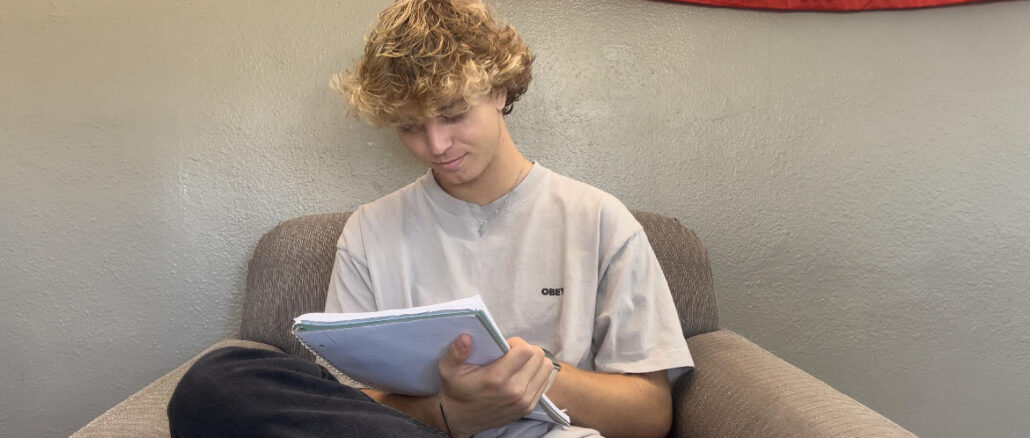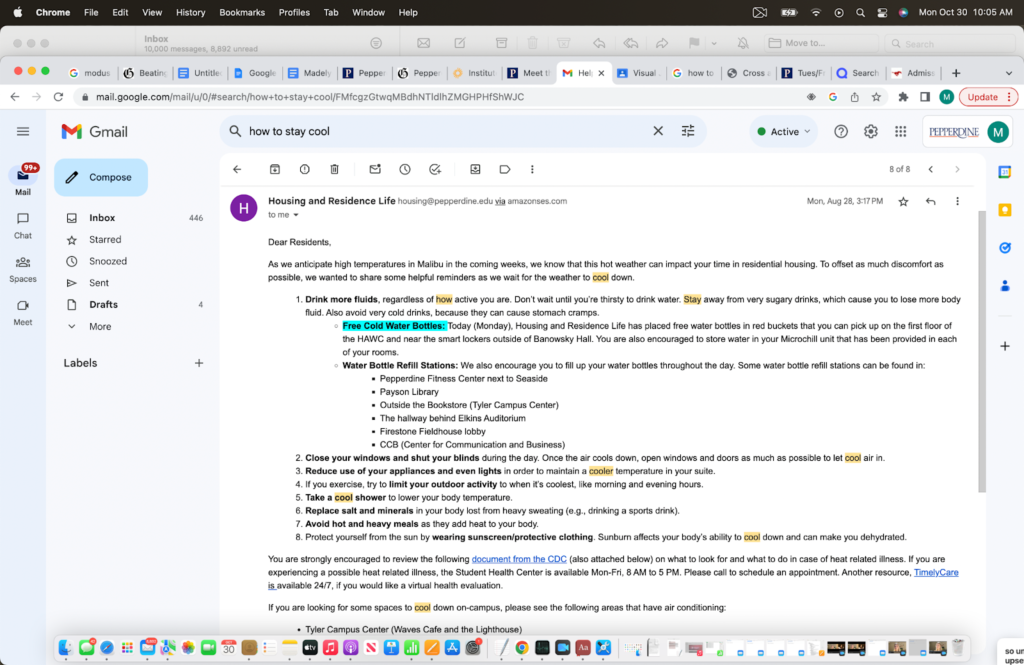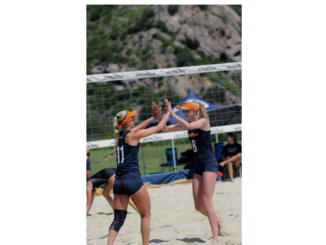
Pepperdine’s lack of air conditioning in student housing has been a heated topic for years. In the sweltering heat of late summer, students often struggle to keep cool.
Record-high heat, global warming and pollution are becoming ever more prevalent in California. The lack of air conditioning at Pepperdine University has caused a slew of issues for students, including sleep deprivation, decreased mental clarity and bugs and dust accumulating due to lack of circulation.
“Sometimes the heat can feel suffocating,” said Phillip Cho, director of Housing Operations at Pepperdine.
While Pepperdine doesn’t yet offer air conditioning in most student housing, the Housing and Residence Life team has systems to offer support and is looking more into natural cooling systems to cool down the dorms and help support sustainability on campus.
Scientists project Global warming and pollutants in California to get worse.
Summer 2023 was the hottest on record.
June, July and August combined were 0.41 degrees Fahrenheit (0.23 degrees Celsius) hotter and 2.1 degrees F (1.2 C) warmer than the average summer between 1951 and 1980. August alone was 2.2 F (1.2 C) warmer than the average, according to NASA.
The difference may seem negligible as temperatures have only climbed a few degrees. However, a few degrees are enough to alter entire ecosystems completely, biology professor Krista Lucas said.
While the campus’s location near the ocean provides some relief, it still is not wholly exempt from the effects of global warming.
“I suspect that it will get worse,” Lucas said. “Malibu is interesting because we have the benefit of being coastal, getting a lot of that kinda of ocean breeze.”
Global warming is an increasing concern worldwide, with California being particularly affected.
“It seems like typically in California, especially in this area, what we’ve started to see is a shift in how the seasons are working,” Lucas said. “What we kind of see is that summer doesn’t really start until July, but now it goes through late September, or even to [October].”
Scientists are also expecting global warming to cause more destructive hurricanes in the coming years.
“With each one, they tend to be more destructive, so as oceans warm, that provides an opportunity for hurricanes to gain a lot more energy, and therefore, by the time they get to land, they are typically more destructive,” Lucas said.
While other states are noticing a decrease in pollution, California is only getting worse, Aria Bendix wrote in a 2023 NBC News article.
Pollution primarily arises from smog and other particulate matter from factories and vehicles. The location of Pepperdine’s campus shields students from downtown LA’s smog due to the natural filtering effect of nearby mountains. However, the campus is not protected from forest fires, which also contribute significantly to pollution.
“It’s been five years since our last fire, and they’re coming more frequently than they used to,” Lucas said. “Usually, what you get with fires is a lot of carbon dioxide, carbon monoxide, and various other gasses, but you also get a lot of particulate matter. Bits of ash and broken-up plants that are floating around. They make the air quality worse, but not just that, then that’s what we’re breathing in, exacerbating any lung issues or any sort of breathing problems.”

Why there is no AC and what to do about it
Pepperdine administrators have repeatedly told the Graphic that air conditioning would be too expensive to add to the dorms when it is only needed for a few weeks of the school year.
In a Nov. 3, 2023 email statement, administrators wrote that installing AC would still be too expensive as it would cause more hurdles for the Planning, Operations and Construction team to overcome.
“The University has carefully evaluated the feasibility of adding air conditioning and identified several hurdles that would need to be overcome,” Ben Veenendaal, associate vice president for Planning, Operations, and Construction, wrote. “Some examples include required electrical infrastructure upgrades to handle the additional electrical load; addressing insulation, including retrofitting windows; and retrofitting of relevant pipes.”
While there are still no plans to install air conditioning for students, Cho said Pepperdine has been proactive in supporting students. For example, Pepperdine Housing and Residence Life has ensured students understand the protocols for staying cool and provided cold water during hot months. This year specifically, they have also installed miniature fridges in student rooms.
“It helps provide a place for students to cool their drinks down or keep food, making sure students are drinking fluids and cold fluids help keep the body temperature down,” Cho said.
Pepperdine HRL also emails students preventive information on how to keep cool when the heat spikes.

They suggested closing windows to trap cool air inside the dorms, reducing light and appliance use, taking cool showers, drinking electrolytes, avoiding hot and big meals and wearing sunscreen.
The August to October heat wave
With record-high heat in Malibu, some Pepperdine students said they think the suggestions from HRL are not enough to beat the heat. Students are experiencing first-hand the effects of rising global temperatures.
Jeffrey Ritchie, a first-year sports administration major, lives on the top floor of his house on Dorm Road. As heat rises with no cool circulation from wind or AC, it can, at times, make the heat feel unbearable.
“If I leave my door open, it’s basically like walking into an oven,” Ritchie said.
Lily Panabaker, a first-year business administration major who also lives on the top floor of Dorm Road, agreed.
“We turned our fans on but only cooled it down one degree, and we live on the top floor, so it’s already hotter in here than it is outside,” Panabaker said.
The heat has caused a slew of issues for students’ overall functionality, including sleep deprivation and decreased mental clarity.
“I used to be able to sleep eight hours, totally fine. Now I can’t at all,” Ritchie said. “Because I’m not getting enough sleep, I’m having a harder time being focused, potentially.”
Other students shared similar experiences. Despite being a so-called quiet area, the library is often loud and acts as a social gathering place, making it hard to concentrate and study. Many students, like Panabaker and first-year finance major Christopher Beard, prefer to study in their rooms but find it difficult due to the heat.
“I’d say it’s difficult in the middle of the day, between the hours of 12:00 to 3:00, doing homework and stuff,” Beard said. “That’s always the roughest because I feel like I just can’t concentrate. I think if I were in a much more comfortable environment, I would be able to work much more effectively on my homework.”
Some students have even resorted to breaking school policy by installing their own AC units to find relief.
“Because of the intense heat, it’s kinda of a necessity,” Beard said. “I would do the same if I could afford it.”
As the school year progresses, the heat is cooling off, but varying weather patterns lead to unpredictability when it comes to the heat in the dorms. It seems that right as it starts to cool down, the temperature spikes again.
“It’s bad for about 15 to 20 days a month,” Panabaker said. “It was really bad the first week of school, and then it got bad again the past two weeks.”
Opening windows don’t provide relief either. In fact, students said it typically makes it worse.
“Opening the windows helps at night when it’s cool outside, but during the day, it makes it worse usually,” Panabaker said. “There’s also a lot of noise that comes in when the windows are open, and if there is any wind, you feel the wind, and it can mess up the blinds or blow stuff over.”
Shutting the windows during the day doesn’t help, either. Because the windows are glass, heat still comes in, according to Artilux, a blog providing housekeeping tips.
“The blinds help because the sunlight can’t get in, but they hinder because then no air can get out, so it’s like a multi-problem,” Panabaker said.
Another issue with keeping the windows closed is that there is only so much a fan can do to provide circulation, Panabaker said.
Eco-friendly air conditioners
Though air conditioning can relieve the felt effects of higher temperatures, AC is not necessarily eco-friendly. In fact, air conditioning units use a large amount of energy to function, emitting a large amount of greenhouse gasses, which contribute to the bubble effect, which traps polluted hot air closer to the ground instead of allowing it to be released into the atmosphere.
Air conditioners are also made out of metal and plastic, which is harmful to the environment, and older AC models contain CFC and HFC, which are major ozone-depleting agents, according to EcoMena, an organization that aims to provide credible information regarding the environment, energy, waste, and sustainability.
There are eco-friendly options, though. Shrink that Footprint, a website that offers support on how to reduce carbon footprints and emissions, offers multiple solutions for eco-friendly AC, such as
- Energy Star-certified ACs which use up to 15% less energy than traditional AC models and meet the Energy Protection Agency standards.
- Ductless mini splits that attach to windows and transfer refrigerants throughout a home. They are also energy efficient.
- Smart thermostats that can detect the temperature of homes and adjust the air conditioner to save energy.
- Evaporative coolers that use water to cool the air as a fan disperses it throughout the home.
When the university officials were planning construction for Seaside, they decided to build the dorms in a way that would cool it naturally.
“They looked at natural wind patterns that come over the mountains and from the ocean and positioned Seaside so that it would catch both of those winds,” Robin Gore, former director of Housing Operations for Pepperdine, told the Graphic “There are air vents at the bottom and top of the rooms; it’s similar to how old farmhouses or old houses were created to draw warm air out and cool air in: it creates a natural flow, natural air conditioning.”
Madelyn Smith reported this enterprise story in Jour 241 during the Fall 2023 semester under the supervision of Dr. Christina Littlefield and Dr. Theresa de los Santos. Dr. Littlefield supervised the web article.




